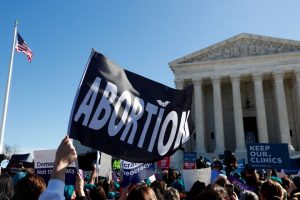By: Anna E. Melo
Impunity Watch News Staff Writer
WASHINGTON D.C., United States – On December 1, 2021, the Supreme Court is scheduled to hear Dobbs v. Jackson Women’s Health Organization to evaluate the constitutionality of a Mississippi law restricting access to abortion in most situations after 15 weeks of gestation-period. The Department of Health in Mississippi seeks to overturn previously decided landmark abortion cases ensuring a woman’s right to terminate pregnancy up to fetal viability (defined as where a growing fetus would be able to survive ex utero). With a 6-3 conservative majority on the Supreme Court, proponents for women’s reproductive rights anxiously await a decision that may transform the landscape of accessible healthcare in the United States.

For nearly 50 years, the holdings of cases such as Roe v. Wade and Planned Parenthood v. Casey have established that the 4th and 14th Amendments support a woman’s right of privacy to choose to terminate a pregnancy without unnecessary barriers. Subsequently, some state legislatures have sought to impose restrictions dictating the limited circumstances whereby a woman would be allowed to receive the procedure.
In 1972, Mississippi enacted the Gestational Age Act which is full of language directed towards the potential emotional and physical harm caused by abortion procedures. It describes various fetal developments week by week up to the ‘cut off gestational age’ of 15 weeks (two weeks into the second trimester). The only exceptions past this threshold point that the Act allows for are medical emergencies or in cases of severe fetal abnormality (notably excluding instances of rape and incest). Physicians are tasked with reporting each abortion procedure conducted under oath, with the threat of civil penalties and/or license suspension or revocation for noncompliance with the provisions of the Act.
Jackson Women’s Health Organization is the last operating abortion clinic in the state of Mississippi, leaving women, especially the poor and minorities, with very few opportunities to obtain the procedure.
Jackson Women’s Health sued the State Health Officer of the Mississippi Department of Health to challenge the Gestational Age Act in 2018 on the merits that a pre-viability ban on abortion is unconstitutional. The district court for the Southern District of Mississippi found that the restrictive obstacles the Act imposes on women were unlawful. The Court of Appeals for the Fifth Circuit affirmed the district court’s decision that the Act was unconstitutional in 2019. The State Health Officer of Mississippi Department of Health and the Executive Director of the Mississippi State Board of Medical Licensure appealed the 5th circuits decision, to which the Supreme Court has granted certiorari.
The topic of abortion is inherently contentious. It invites arguments and counterarguments concerning religion, philosophy, politics, and medicine. A case on the Supreme Court’s docket, especially in 2021, may leave more questions than answers. Will advancements in medicine naturally shift ‘fetal viability’ earlier into a pregnancy? Will an outright overturn of predominant case law in women’s and reproductive rights cause a domino effect in various conservative states to ban abortion altogether or the adoption of certain restrictions such as the ‘Heartbeat Bill’ at six weeks gestation? Will we see action by Congress in an attempt to implement federal law that counters prohibitory state actions? In the next few months, the Supreme Court will be tasked with balancing these delicate matters that will have an undoubted impact on the status of women’s health and human rights in the United States.
For more information, please see:
5th Circuit – Decision Jackson Women’s Health Org. v. Dobbs, 945 F.3d 265 – Dec. 13, 2019.
Mississippi Gestational Age Act – Current through 2021.